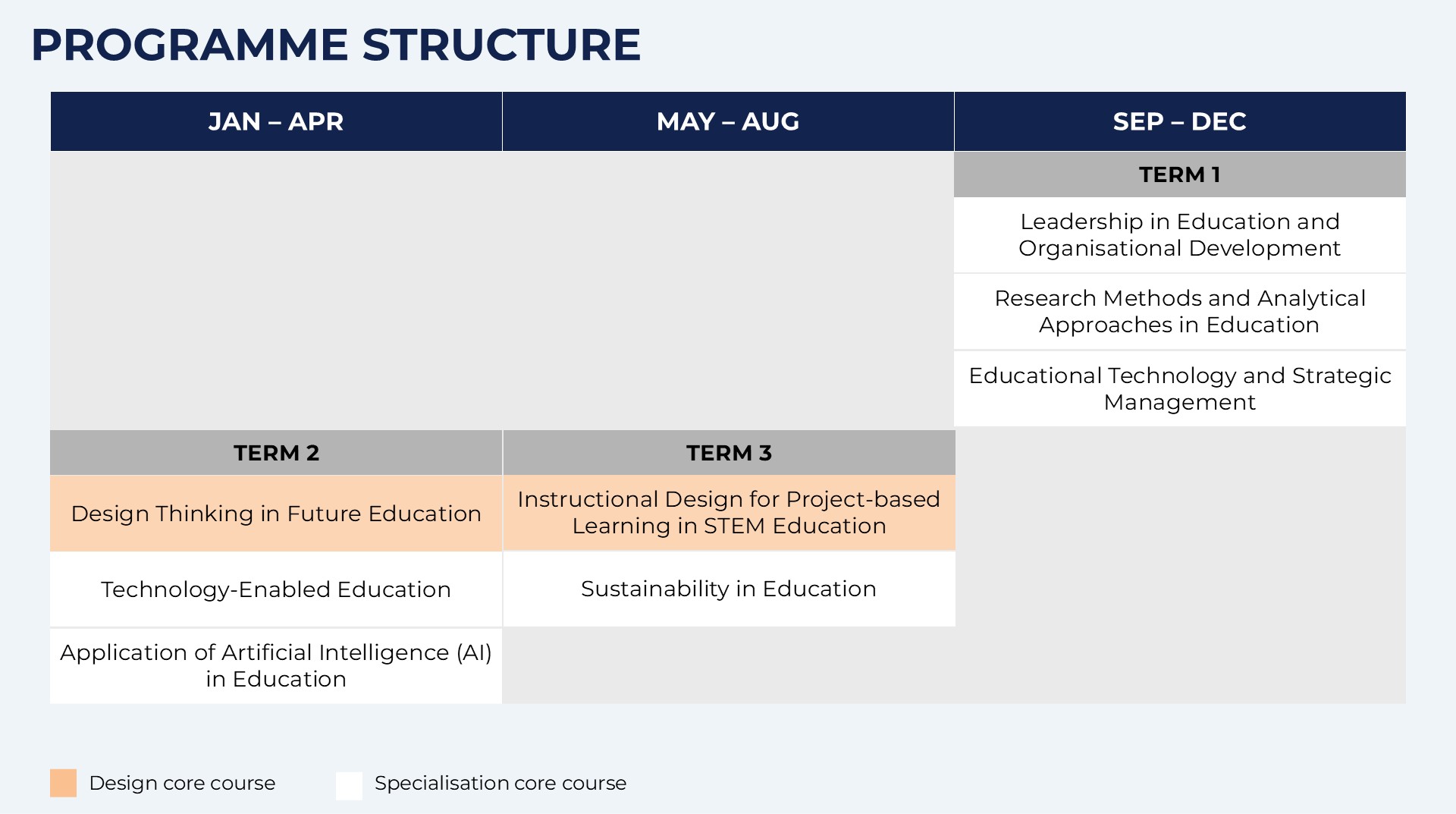Host university in China; and
SUTD
Master of Science in Technology and Design (AI and Technology in Education)
Programme schedule
The MTD (AI and Technology in Education) is a one-year full-time coursework-based Master programme. This programme is conducted in bilingual format (ie in both English and Mandarin). It comprises eight courses (96 credits)—two core design courses and six specialised courses, organised as follows:

- Term 1, held at a host university in China, focuses on educational administration and management.
- Term 2, conducted at SUTD, Singapore, explores technology, artificial intelligence (AI), and human-centric pedagogy.
- Term 3, also conducted at SUTD, Singapore, delves into sustainability and design-centric pedagogy.
Course descriptions
Leadership in Education and Organisational Development (12 credit points)
This course aims to provide students with a comprehensive understanding on various aspects of school leadership and management. Key areas covered include the role of schooling in the 21st century, the mission and responsibilities of school leaders, development and formulation of school strategy and direction, the importance of school culture, curriculum design and pedagogy. The course will also delve into staff management and development, school management and evaluation, and the cultivation of school partnerships.
Research Methods and Analytical Approaches in Education (12 credit points)
Research methods in education and social sciences are explored, with a focus on various types of educational research and research procedures. Students will gain skills in formulating research questions and hypotheses, measuring variables, evaluating research, and applying basic quantitative methods, including experimental designs, correlational studies, and surveys. Fundamental statistical analyses, qualitative research, and mixed design approaches are also covered. Additionally, action research will be introduced, along with guidance on writing research reports and proposals.
Educational Technology and Strategic Management (12 credit points)
Students will gain a solid understanding of the key roles technology plays in education, including the benefits and challenges of its implementation. They will also learn strategies for effectively utilising technology to support teaching and learning outcomes. The course also delves into learning theories and how technology can enhance the learning process, as well as examining strategies to enhance teachers’ pedagogical and technological proficiencies.
Design Thinking in Future Education (12 credit points)
This course examines the intersection of government policies, cultural influences, and economic strategies in the development and adoption of educational technology in China and in Singapore. Emphasising a human-centred approach, it explores how technology enhances learning, drives educational reform, and addresses the needs of students and educators. Comparative insights into global approaches provide broader context for understanding educational technology integration. The second half term of the course introduces design thinking across various scales and design disciplines. Students will be exposed to core technologies and design concepts, including design principles, processes, modes of thinking and analysis, prototyping skills, and the social aspects of design.
Technology-Enabled Education (12 credit points)
This interactive course is designed to explore the dynamic intersection of technology and pedagogy. It will examine various classroom response systems, harnessing data to enhance learning outcomes. Additionally, the course will explore innovative methods for creating digital content tailored to flipped classrooms – an approach that fosters greater student engagement and autonomy. Within this evolving educational landscape, the course will also introduce the immersive potential of Augmented Reality (AR), Virtual Reality (VR), and Mixed Reality (MR), offering hands-on experiences that demonstrate the practical applications and impact of these technologies. Furthermore, the course will take a close look into the Internet of Things (IoT) and its transformative influence on interactive learning environments, as well as the role of gamification in education. Lastly, the course will delve into telepresence learning systems, examining how they elevate traditional online learning experiences.
Application of Artificial Intelligence (AI) in Education (12 credit points)
This course is designed to empower the students with the latest knowledge and skills to effectively integrate Artificial Intelligence (AI) into their teaching practices and educational management. Students will be exploring the basic Python programming and machine learning methodologies, with a focus on their application in education. The course covers the fundamental concepts of AI, its applications in the education setting, and the use of learning analytics to enhance student outcomes. Educators will learn how to leverage AI tools to create personalised learning experiences, create digital content for flipped classrooms, boost student engagement, and make data-driven decisions. By the end of the course, educators will be equipped with the knowledge and skills to effectively harness AI to support diverse learning needs.
Instructional Design for Project-based Learning in STEM Education (12 credit points)
The first half of the course will focus on key instructional design principles and frameworks crucial for designing, creating, implementing and evaluating project-based learning. Students will apply these frameworks to conceptualise and develop innovative hands-on activities and open-ended projects in Science, Technology, Engineering, and Mathematics (STEM) disciplines. Examples will be shared on how SUTD designed and executed its design projects. Students will also learn to create assessment rubrics for project evaluations. In the second half of the course, students will be introduced to CAD modelling, 3D printing, microcontrollers, and coding as essential tools for prototype development.
Sustainability in Education (12 credit points)
Students will gain the knowledge and skills needed to effectively integrate sustainability principles into STEM education. The course will explore the diverse aspects of sustainability and its relevance across various STEM disciplines, with a particular emphasis on the role and application of AI. It will offer an in-depth exploration of active learning techniques, case studies, and group projects focused on both STEM and sustainability. Through this, students will be empowered to promote a culture of sustainability within their educational institutions or organisations.
